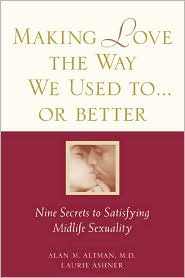

 |

|

The average rating for Making love the way we used to-- or better based on 2 reviews is 3 stars.
Review # 1 was written on 2009-10-17 00:00:00 Philip Johnson Philip JohnsonI Love this book... It's a collection of talks and essays by Adi Da Samraj on human emotions, love and "sexuality" taken in a broad sense. There is a great deal of content here but there are at least two aspects to the consideration that really spoke to me: The first is about our open and whole body participation in the energetic and full dimension of life, which is a tangible expression of divine consciousness. Usually we habituate to a very small spectrum of feeling and its associated phenomena (thoughts, body sense, and limited emotions) as opposed to living the full spectrum of our possibilities as human beings. "When the individual is frustrated, it is Life in him that is suppressed. The Force of Life is naturally expansive, moving, blissful, and undefined. But frustration or suppression of the feeling being, the whole body, tends to create an equal and opposite reaction, in the form of reactive contractions of attention(into forms of thought) and emotions (into reactive forms, such as fear, sorrow, guild, anger, and self-doubt) and body ( into genital tension and organ and muscle tensions or dis-eases all over the body)...Instead, ecstasy is realized in Divine Communion moment to moment, and the reactivity of the body mind is thereby undermined and made penetrable by the Force of Life. Thus, the devote is not obliged to solve the problems created by the chronic reactivity, but he penetrates reactivity with living force, and he lives a happy life of love and service and constant Fullness in God (100-101, Love of the two Armed Form)" The other aspect has more to do with understating our ritual reactions to how we relate with others in a form of self bondage and other binding activity. Because we feel vulnerable to others we always protect the heart and interpret unavoidable hurts as reasons for punishment (directed at the other and ourselves) or withdrawal. This is one of the primal expression of our self contraction (self centered activity), and thus one of the primarily means to understand and transcend that activity. This quote is from another book, but it sums up the point well: "The Eogic Ritual Calls every individual To Defend himself or herself Against The Wounds of Love and the Wounding Signs of Un-Love (or eogic self Contraction) In the daily world...The necessary Prerequisites for such Relinquishment [giving up this ritual, my insertion] Are Vulnerability (or The Ability To Feel The Wounds of Love Without Retaliation), Sensitivity To the other in Love (or The Ability To Sympathetically Observe, Understand, Forgive, Love, and Not Punish or Dissociate From the other in Love), and Love Itself (or The Ability To Love, To Know You Are Loved, To Receive Love, and To Know That Both You and the other, Regardless of Any Appearance To The Contrary, Are Vulnerable and In need Of Love) (368-369, Dawn Horse Testament, 1st ed.)" Along with the content, I Love the language... |
Review # 2 was written on 2012-02-20 00:00:00 Julia Aleman Julia AlemanI had to read this book for a course of study I am completing. In this book Adi Das (aka Bubba Free John aka etc etc) and his followers are very vocal about his spiritual mastery and how he was awake from birth with the mission to enlighten devotees. To me enlightenment is a pure state of being at one with yourself and the universe - in this place the quest for enlightenment (or anything else) ceases to be important. Talking about how enlightened one is is also not necessary. Advertising ones specialness and protesting against ones ordinariness is comical…when one considers that in essence we are all made of the same stuff, carbon based lifeforms lit by the spark of divinity. How is one spark more special than another? Silliness! Mr Das has gone to a lot of effort to create his very own convoluted language of specialness (and used many capital letters to emphasise this specialness) to describe something essentially very simple and native to every being alive. In doing so he has made something natural into something elite and inaccessible to most. Ironically his complex delivery of his truth on unity imposes a separateness…just like seeing a Buddha on the road distracts us from being at one – it imposes a separateness (me, the road, the Buddha, or in this case amongst other things - capitalisation, and convoluted prescriptive language) which is exactly the opposite of what being at one means. Some positives: I really enjoyed his description of sexual communion as “opening the whole body to the hearts delight in the all pervading radiance of God. Sexual communion is a form of bodily prayer, or whole body feeling- surrender, through the loved one to the divine Beloved” There are plenty of hidden gems in this book if you can bear to wade through many irritants such as the prescriptive tone that his Way is the only Way (“we must, we must!”), the cult-speak of a made up language and the mashing together of many religions/philosophies truths to make his own hybrid “Way”. Perhaps my critical interpretation of this book is coloured by my lived experience of union with God as a simple and natural occurrence of emptying out and merging. Complexity of language and process leads me down rabbit warrens of the mind and away from The Beloved of my heart who I feel is gently laughing at all our attempts to formulate ways and processes to find Him/Her when S/He is always ever present, waiting with arms open for simple surrender to what is in every moment. |
CAN'T FIND WHAT YOU'RE LOOKING FOR? CLICK HERE!!!